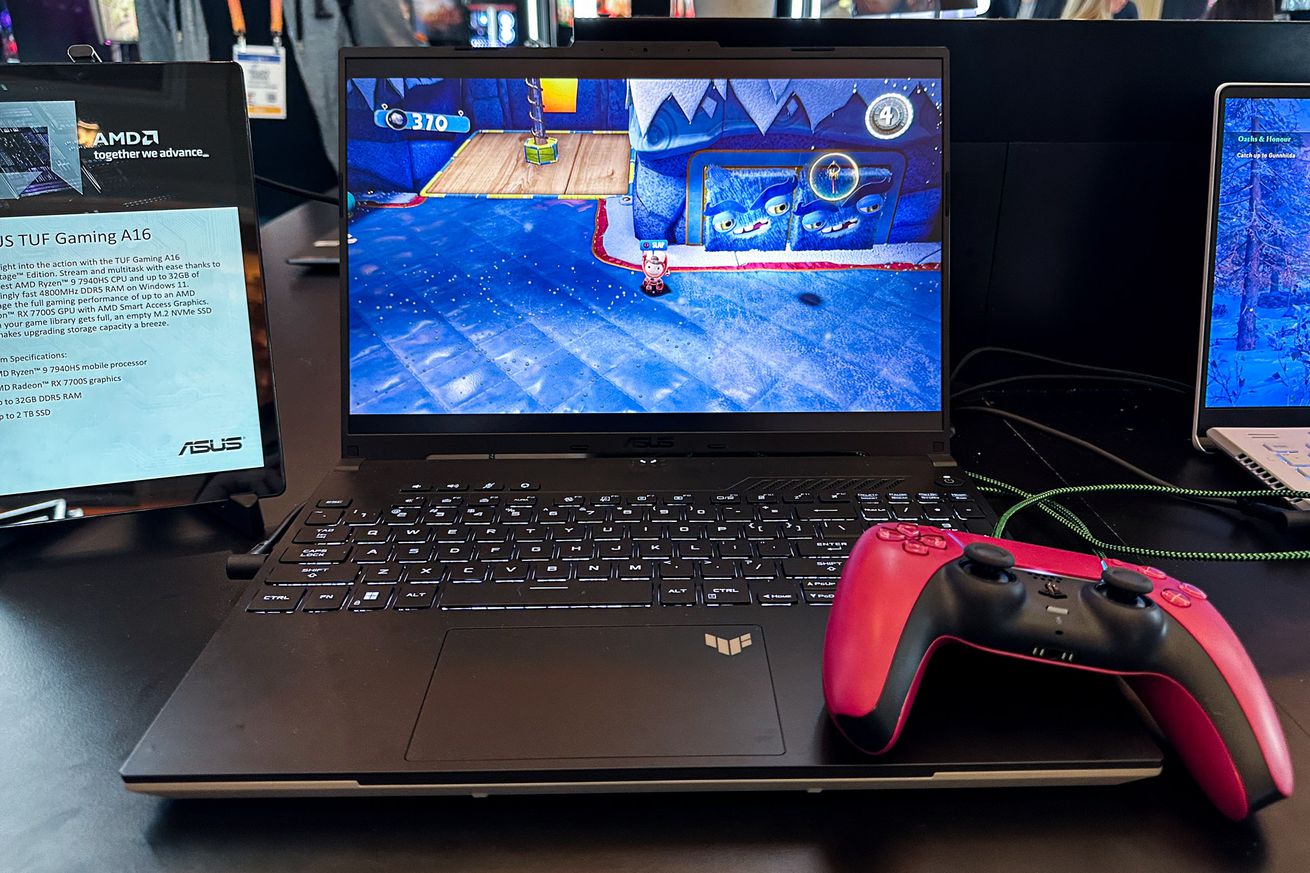
There is exactly one game I can confirm RDNA 3 mobile can run
Last week, AMD announced its upcoming Ryzen 7000 mobile CPUs and RDNA 3 laptop GPUs, and we got some very brief hands-on time with them. Well, okay — hands-on time is a stretch. I was able to play one specific title on one specific all-AMD system in the company’s demo area at CES 2023 last week. But that does at least confirm that these chips are real and functional in this year’s gaming laptops.
The company had a number of upcoming laptops from partners on display at the show, including some of the most anticipated models from Asus and Alienware that we covered over the course of last week. Most of them were running videos that showed off the laptops’ displays but did not clue us in about how the chips inside might perform.
But there was one — exactly one — laptop running a game you could actually play. That was the Asus TUF Gaming A16 Advantage Edition, one of not-too-many 2023 gaming laptops that have been confirmed to be AMD-only (that is, running both an AMD CPU and an AMD GPU). This system is expected to be available in Q1.
The TUF on display was, according to AMD’s signage, rocking a Ryzen 9 7940HS processor and a Radeon RX 7700S graphics card. The 7940HS has eight cores and 16 threads and is built on AMD’s Zen 4 architecture. It’s not to be confused with the Ryzen 9 7945HX (also Zen 4), the monstrous 16-core chip that leads the Ryzen 7000 line. (I asked AMD if I could try that one, but they didn’t have any of its systems on hand.) The 7700S is tailored for thin and light devices (the M-series is what you’ll find in beefier fare this year), offering 32 teraflops of performance with 8GB of GDDR6 memory.
The one and only game running on this system in AMD’s demo area was Sackboy. I don’t really know how to play this game, but it seems to involve a lot of collecting coins and running away from (very cute) monsters who are trying to destroy you.
Of course, what AMD had on display was a preproduction sample, so there weren’t framerates displayed (and if there had been, I wouldn’t be able to share them). The one observation I can take away from my brief playing time was: Sackboy was running. It appeared to be running well. Jumps and turns were smooth, and Sackboy responded to my taps of the PS5 controller as quickly as I would’ve expected. I enjoyed playing the game and wasn’t worried about technological limitations.
Now, Sackboy (while it does have ray tracing) is not a title we would expect to be particularly challenging for the hardware in this laptop. (“Is this a CPU-heavy or GPU-heavy title?” I asked the AMD representatives who were on site. “It is not a heavy title,” they replied.) It was running at 1920 x 1200 resolution. This laptop will have a QHD 240Hz option as well, and I’d expect that system to be the real test of AMD’s top hardware this season. This particular system is far from a comprehensive look at either of these AMD chips and their limitations.
If you’d like to know more information about the TUF Gaming A16, Asus described it as “a sleek gaming laptop built to demolish the competition.” It supports AMD’s Smart Access Graphics, which allows Radeon GPUs to control a system’s display directly, and has a MUX switch. It’s set to be available in Q1 of 2023.
AMD has promised that the 7700S can run Cyberpunk 2077 at 87fps, Tomb Raider at 142fps, and Death Stranding at 147fps with maximum settings. Somewhat unhelpfully, these tests were all performed in 1080p, while many of the partner laptops the company featured in its keynote will offer QHD screens. We’ll need to see for ourselves just how well these chips can take advantage of those displays.
All those caveats aside, getting to try out these chips — even on such a light lift — got me excited. I’m very much looking forward to seeing them in a laptop that’s ready to hit shelves and see if the claims AMD’s making about CPU and GPU performance pan out. AMD merely intended for this demonstration to be a nice teaser of what’s to come, and my time with the A16 Advantage Edition certainly accomplished that. These are real chips that can run a real game, and that’s all we’re going to get for now.
Photography by Monica Chin / The Verge

